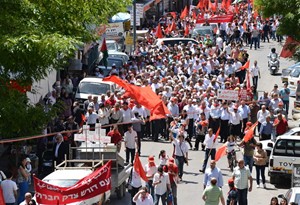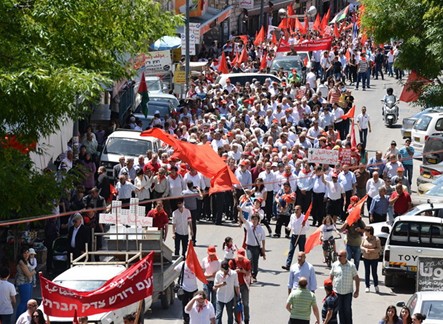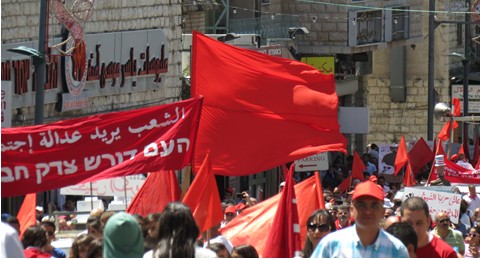
In the eve of May Day, the work dispute that the Histadrut (General Federation of Labor in Israel) had planned calling on Tuesday was postponed “after progress in talks between the Finance Ministry and the Histadrut.” Histadrut chief Ofer Eini and Minister of Finance Yair Lapid held talks that “were termed positive.”
Treasurer Yair Lapid said, Monday morning, that he intends to introduce legislation to prohibit strikes at Ben-Gurion International Airport, seaports, the Israel Electric Company and other essential services. Finance Ministry sources say the legislation would take the form of an amendment to current law. The proposal came against the backdrop of a threat by Chairman Ofer Eini of the Histadrut Labor Federation to declare a general labor dispute, which could lead to a general strike. Under the bill the Histadrut would be limited to striking in case of withheld wages. Strikes would not be allowed due to reforms, restructuring or the establishment of private ports to compete with Haifa and Ashdod. The legislation would require workers to submit to arbitration.

Anti-neoliberal and anti-capitalist slogans during the Hadash and Communist Party of Israel
May Day rally, in Nazareth (Photo: Al Ittihad)
According to Hadash and communist activists in the Labor lead Histadrut the unions must call a generalized strike action, which would send a message to the neo-liberal Government that workers are not prepared simply to “accept their lot.” Unions must co-ordinate actions as they attempted to fight back against cuts to pay, jobs and pensions in the public sector, they said. The Histadrut leadership has made no announcement to the media, as it has done in the past on the eve of such declarations, that it intends to call a work dispute.
At the core of the dispute between the Histadrut and the Finance Ministry are several issues: taxation on advanced-training funds, which would cost employees NIS 2.5 billion, a planned NIS 2 billion cut in public workers’ salaries and more privatizations. Last week Israeli Prime Minister Benjamin Netanyahu said strikes won’t stop planned privatizations, even as the Histadrut labor federation threatened to take action over the government budget. “We intend to implement a series of reforms to increase competition in the economy,” Netanyahu told Israel’s parliament, the Knesset.

“The people demand social justice” a slogan at Hadash and Communist Party of Israel
May Day rally, last Saturday, in Nazareth (Photo: Eli Gozansky)
Despite this, the Israel Medical Association (IMA), which signed a new contract with doctors’ public employers after holding a very long strike in 2011, declared a work dispute on Tuesday. IMA chairman Dr. Leonid Eidelman said the reason was changes proposed by the Treasury as part of its Arrangements Bill accompanying this year’s budget proposals. “We stand before a struggle of economic decrees expected in the Arrangements Bill that are liable to hurt doctors and endanger public health. We will not allow harm to the contract; public health is not a table in an Excel program,” he said.
Eidelman said the Treasury’s wage chief did not respond to queries raised by the IMA. “We demand that unilateral moves not be taken by the employers. We expect the Treasury wage chief to preserve existing labor relations and collective agreements so he does not harm physicians’ work conditions.” The Treasury has contemplated a number of changes, from taxing grants to doctors who agree to work in the periphery to limiting the tenure of government hospital directors. The IMA fears that massive cuts expected in the state budget will violate Treasury agreements that were reached with the IMA at the end of the strike.


